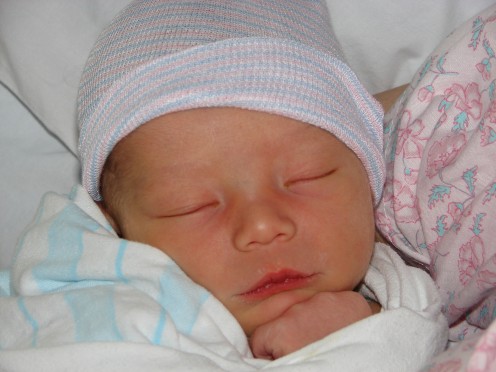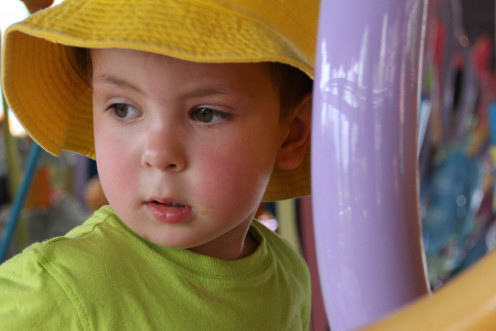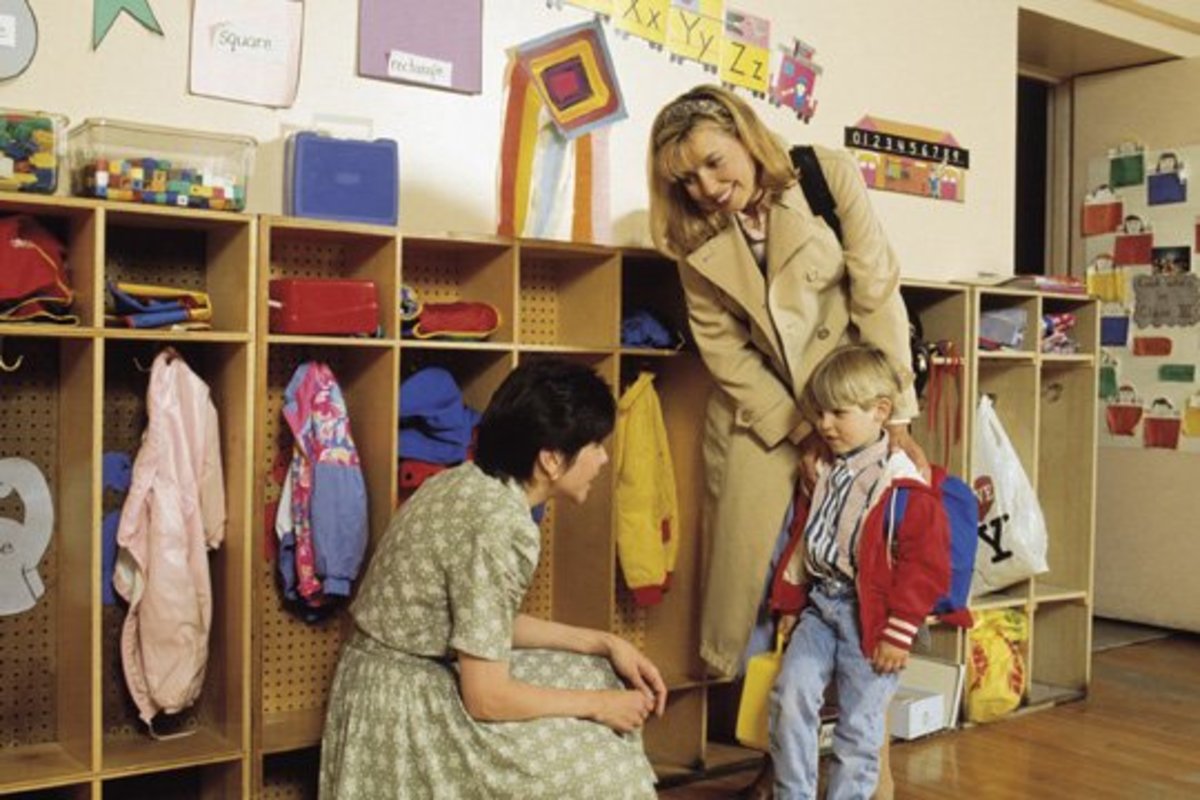Should I Have Children? The Reality of Having Kids

Tips and Advice Before You Take the Plunge
Very few people really tell it like it is about having kids. You see it all the time. People only express the positives of having kids and raising kids because to do otherwise seems cruel, unappreciative, and potentially dangerous. Tell anyone that there are things that suck about raising kids and there's a decent chance some moral red flag will go off in their brain and they'll call social services on you. Or they'll just think you're a crappy human being.
The fact is: many things about having kids sucks.
Despite this, parents rarely tell prospective parents some of the pitfalls. It's like they're trying to sucker them into the whole thing. So what sucks about having a kid?
1. Lack of Sleep
Okay, most people will tell you about this one, but hardly anyone will tell you the extent of the problem. Oh sure, you hear about the occasional kid who's sleeping through the night at 9 weeks, but this is far from the norm. Most children don't sleep through the night until much, much later. In some cases, it's years before their sleep normalizes into what we think of as adult sleep. Rest assured though, the parents' sleep will never be the same again. Those days of sleeping in are gone (unless you have a very understanding spouse). I used to sleep until 9 or 10 in the morning. Now I'm up every day before 6. If you are not a morning person, having kids is not for you.
Ever wonder why immediately after having a child everybody on the face of the earth is asking the new parents how they're sleeping (and giggling under their breath as they walk away)? If they have their own children, it's because their taking great joy in knowing that the newbie parents are suffering just like they were. They know that they've been suckered into the whole thing just like they were. New parents are the new dummies on the block and the older parents suddenly relieved of that embarrassment for not knowing the whole secret that babies who sleep through the night are basically a myth.
The sleep problem can be torture for many parents. If your kid doesn't sleep exactly the way you want them to, parents often resort to some kind of training, a fairly robust conflict within the world of child-rearing that breaks down like this: cry to sleep vs. not cry to sleep or sleep training vs. no sleep training. Many people believe in the cry-to-sleep method, also known as the Ferber method. However, know if you resort to this method, you're likely to feel like a piece of garbage. I've heard many stories of mothers crying outside their child's door as the child screams and screams and screams. Sure, maybe it works, but at what cost?
The medical establishment is usually not helpful with this either. Studies generally show that sleep doesn't normalize as fast as most general practitioners and pediatricians would lead us to believe, which is why they usually ask "how's she sleeping?" too. In fact, many doctors will recommend sleep training as a way to solve babies not sleeping through the night. The fact is, sleep training does generally work. It's just that its overall implementation and long-term effects on children have not been fully studied and many believe their implementation can be detrimental for kids at such a young age.
This just goes to show what lengths parents will go to get more sleep. Some people function fine without much sleep. Others, not so much. It ends up affecting all facets of the parent's lives.
2. Your LIfe Will Never Be the Same
From eating standing up to struggling to find time to participate in any hobby you used to have before the kid came along to getting to work late to the general pace of your life - nothing will ever be the same. Depending on who you are, you may spend every waking minute loving the process of raising your children. However, if you're a normal human being, you may also spend a lot of time lamenting that life you used to have. Don't worry, it's perfectly normal, but it can take a toll. I like to tell people that having kids is 50% amazing and 50% hell (at least the first couple of years, for sure). While you're in the 50% amazing part, you can't imagine your life without your bundle of joy. Then there's that other part where you wonder if you made the right choice. It's a hard dichotomy to reconcile.
3. The Stress in Your Relationship Will Magnify
Not only will the stress magnify, the relationship will change. Unless you have a very, very balanced relationship, the little things will begin to get to you. It's only natural. When you have kids, you start dealing with fairly mundane issues: diaper changes, sleeping, feeding. It's hard not to be in a situation where one partner is doing a little more (or a lot) more work than the other partner. It's hard not to be in a situation where one partner is telling the other one what to do. It's hard not to have tiny disagreements about dealing with the kids - from punishment to television-watching to whatever. Don't kid yourself, you and your partner might argue over minutes of television viewing and its affect on your youngster. Argue about these seemingly minor issues over and over and suddenly you're feeling very resentful. And oh yeah, sex. If your relationship was built on it (and many are), you're in for a big surprise. Both of you will be so tired most of the time that finding a moment where you're both in the mood will be nearly impossible.

What is the hardest thing about having children?
What is the best thing about having children?
4. You Will Dream about Bad Things Happening to Your Kids and Freak Yourself Out Constantly
One of the things I deal with well, but can't stand, is that I have nightmares about my kids getting hurt. I think every parent has this. Mine usually involve simple things like them running out into the street and getting hit by a car. For whatever reason, I imagine this happening and realize that I might not be able to survive it. I suppose this is my brain telling me how truly important my kids are, but I certainly wish it could do it some other way. I've had parents with much more experience than I tell me that such nightmares never really end. There's also those times you're in the parking lot and you look away for a second and your kid has walked around to the other side of the car. For that instant, you think he's been kidnapped or disappeared or whatever. It is a seriously terrible feeling and you beat yourself up over it. It's an odd form of torture. You know the self-criticism makes you a better parent and better prepared for the next thing while you wonder how you could be so oblivious in the first place. With kids, you have to be on your toes at all times.
5. Unless you're really, really rich, say goodbye to your money. Kids are expensive.
Following the birth of my second child, one of my co-workers who is quite smart and contemplating having children, walked into my office and asked: "Somebody told me kids are expensive. Are they?" So I told her: "Starting next year, our daycare bill will be $3,000/month." Her eyes got big, her jaw dropped, she stopped speaking. Apparently people really don't know that kids are expensive. In fact, I had no idea in some respects. If you and your spouse want to maintain careers, you'll end up spending as much on daycare as you will your kid's college education. And speaking of that college education, if you want to have any chance to pay for it, better start saving the second the child is born. I received this advice from friends with a couple kids who said they started saving too late and simply wouldn't have enough to put them through college (not that that's a necessity). Kids are, in fact, so expensive that often one spouse (most often the wife) will quit her job and stay home.
6. Getting Sick
Here is my least favorite thing about having kids: when they get sick at daycare, they get sent home, usually for 24 hours. So, if you're like me and both you and your spouse work, one of you has to leave work and come home. You have to negotiate between you which one is less busy or less important, drop everything you're doing, and leave. As I sit here, right now, my son has been sent home for having more than 2 diarrheas in a 24 hour period. He's not "sick" in the classic sense of the word - he's in a good mood, happy; etc. But there are rules for daycare and this is one of them. Thus, my work day is screwed. You feel pressure from all sides: home, work... and it's like you're failing every one of them. And if your kids aren't in daycare, getting sick may not matter that much, until they're in kindergarten. They don't have the antibodies to deal with the other kids, so suddenly they're getting sick all the time, as are you.
7. Breastfeeding
You might be thinking: you're a dude. What do you know about breastfeeding? Well, I'll just say this: it can be hard, really hard on the mother. If you choose to breastfeed (and it's one of the best choices you can make for your child) just know that the road isn't a smooth one. I know that my wife felt very undersupported (and I was partially to blame). There's a devil's bargain going on between pediatrics and formula companies and many doctors don't seem to care one way or the other. And if the doctors are supportive, your spouse may be ambivalent, particularly if there are difficulties because formula just seems so damn easy. Then there's daycare. They often just want what is easiest for them and formula is easier. All this adds up to something a woman really doesn't need after giving birth: a very sketchy support system for breastfeeding. Bottom line is that breastfeeding is better than formula in every way and finding the proper support system can be really hard.

More Answers about Having Children
Summary (and the good stuff)
It probably sounds like I don't enjoy being a parent. Actually, I do. Very much. But I'm also a realist and frankly, I'm not yet a complete parent. My oldest is only 28 months old and, as most parents know, those first few years are often the hardest. Many of my male friends with children have not enjoyed or do not enjoy the early years, but have really perked up as their kids have aged.
It also might sound like I'm not involved, but that is not correct either. I'm very involved. I change most of the diapers. I take my kids on adventures whenever I can. I try very hard to do as much as my wife (except when it comes to breastfeeding).
But I'm a realist too and the realist in me always looks at things from both sides. As I've indicated above, raising kids can be really, really hard. Many people say it's the hardest thing you'll ever do in your life. Too many people enter into it all glossy-eyed and smiley. Then when they're in the hellish parts, they don't know how to cope.
So although it's hard, I'll leave you with this, which explains all the great things about having kids: once you have children, you'll have no idea how you could ever live without them or ever love something that much. Ultimately, it is very rewarding.








